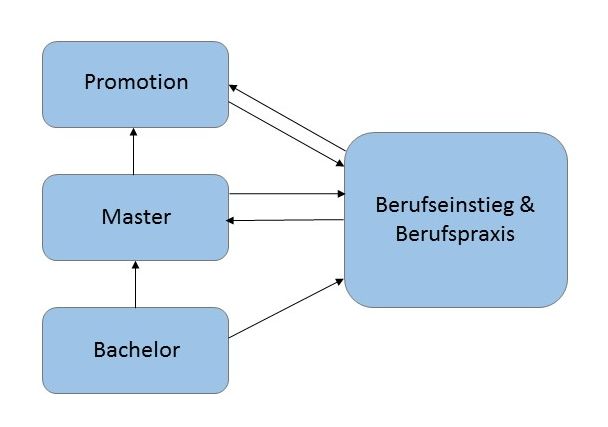Bachelor and Master

Bachelor's and Master's degrees are internationally recognized. With the Bachelor's degree, a first university degree is obtained after 6 to 8 semesters. Afterwards, graduates can decide whether they want to enter a profession directly or take up a Master's degree course, usually lasting 4 semesters.
To enter the teaching profession at a state school, graduates must have completed both the Bachelor's and M.Ed. degree programs. The traineeship and the second state examination must also be completed.
The tiered study system offers a number of advantages. With the Bachelor's degree, students acquire a professional qualification after a short period of study, the degrees are internationally recognized and great importance is attached to interdisciplinary knowledge, which can be helpful in later professional life.
Bachelor's Degree
Bachelor's Profiles
The University of Bremen offers six different bachelor's degrees.
Specialist degree programs:
- Single major subject bachelor's degree,
- Two-subject bachelor's degree.
Specialist degree programs are generally professionally qualifying, i.e. they are not geared towards a specific appointment, such as in teaching or Law. While you study one subject in the single major subject bachelor's degree, in the two-subject bachelor's degree you combine a major subject (approx. 2/3 of the degree course) with a minor subject (approx. 1/3 of the degree course). A major subject can be combined with any of the minor subjects offered. When choosing a minor subject, please note the information on overlap-free courses.
Teacher training programs:
- Bachelor's degree in Teaching Profession at Elementary School (3 subjects plus educational science),
- Bachelor's degree in Teaching at Secondary School (2 subjects plus educational science),
- Bachelor's degree in Inclusive Education at Primary Level (4 subjects plus educational science)
- Bachelor's degree in Inclusive Education at Secondary Schools (2 subjects plus Educational Science).
In the teacher training degree programs, subject-specific didactics and educational science take up a large part of the course in addition to the subject science.
Title After the Bachelor's Degree
Depending on the discipline, the following degrees can be obtained at the University of Bremen:
Bachelor of Arts (B.A.) with a major subject in the Humanities, Languages, Cultural Studies, Arts and Social Sciences as well as in a study course with a teaching option
Bachelor of Science (B.Sc.) with major subject in Mathematics, Psychology, Natural Sciences, Engineering and Economics as well as in a teaching training programm at grammar schools and secondary schools with two natural science subjects
Bachelor of Laws (LL.B.) in Law
Overview of Bachelor Profiles
The following table provides a brief overview of the various Bachelor's degrees that you can obtain at the University of Bremen.
| Profile | career goal | subjects | Statements Title |
|---|---|---|---|
| Bachelor's degree single major subject | Academic profile with general professional orientation | 1 subject | B.A., B.Sc., LL.B. |
| Two-subject Bachelor's degree specialist profile | Academic profile with general professional orientation | 2 subjects: 1 major subject and 1 minor subject | B.A., B.Sc. (the title depends on the major subject) |
| Bachelor's degree in Teaching at Secondary School | After the Master of Education and traineeship: teaching at high schools | 2 equally weighted subjects | B.A., B.Sc. (B.Sc. only in case of 2 subjects from mathematics and natural sciences) |
| Bachelor's degree in Teaching at Primary School | After the Master of Education and traineeship: teaching at primary school. Focus on elementary education possible. | 2 large subject, 1 small subject | B.A. Educational Sciences for Primary and Early Education |
| Bachelor's degree in Inclusive Education at Primary Level | After the Master of Education and traineeship: teaching professions for special education and primary schools | Inclusive Education, 1 medium subject, 2 small subjects | B.A. Teaching degree Inclusive Education/Special Education in Primary Education |
| Bachelor's degree in Inclusive Education at Secondary Schools | After the Master of Education and traineeship: teaching professions for special education and inclusive education at secondary schools | Special education and 1 subject | B.A. Teaching Profession for Inclusive Education / Special Education at Secondary Schools |
After the Bachelor's Degree
The Bachelor's degree opens up various possibilities:
- Direct transition to employment in business, industry, associations or public service
- Admission to a one to two-year master's degree program with the award of Master of Science (M.Sc.), Master of Arts (M.A.) or Master of Laws (LL.M.) degrees
- Admission to a one- to two-year master's program with the award of Master of Education (M.Ed.)
Master's Degree
Master's programs are three- to four-semester post-graduate courses that require a bachelor's degree to be admitted to studies. Master students acquire in-depth knowledge either in specific specialization areas of their previous (consecutive) degree program or in new fields of knowledge. The master's degree is an internationally recognized career qualification. Graduates can also move on to take up a doctorate as a further step towards an academic career path.
Between the Bachelor's degree and taking up a master's degree, there may also be periods of employment. Thus, individual educational paths with both employment as well as periods of study are possible. Depending on the focus, the Master distinguishes between more research- or application-oriented study programs. Master programs providing further education require qualified practical professional experience.
At the University of Bremen you can obtain the following degrees after completing a master's degree:
- Master of Arts (M.A.) in Humanities and Social Sciences
- Master of Science (M.Sc.) in Science, Mathematics and Computer Science
- Master of Education (M.Ed.) after teacher training
- Magister Legum (M.LL.) in Law
You can find information about the admission requirements and the application procedure for Master programs at the University of Bremen on our master info website.

